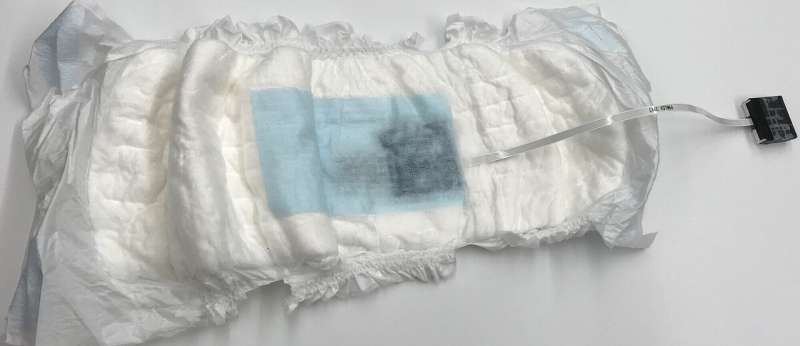Autonomous diaper sensor better detects urinary tract infection

Urinary tract infections are the second most common type of infection in children, with ear infections taking first place.
Responsible for nearly 10 million doctor visits each year in the U.S., urinary tract infections can also be a major source of additional disease, particularly for elderly people.
Purdue University researchers have come up with a way to embed an autonomous sensor device in diapers to better detect UTIs. The disposable device has been tested and proven to accurately detect the infection, as seen in this video:
While treatable with antibiotics, checking for UTI at the doctor's office typically involves testing a urine sample for bacteria and blood cells. These samples are hard to collect in individuals who wear diapers.
"We have at least two big advantages here with our device," said Babak Ziaie, a professor of electrical and computer engineering at Purdue. "Because it's autonomous, it doesn't require the patient or caregiver to obtain urine samples, and it can help detect an infection in people who either aren't able to communicate their symptoms, or they don't show typical symptoms."
UTIs develop when bacteria get into the urinary tract and multiply, leading to redness and pain in the urinary tract. Some typical symptoms include an urgent need to urinate, a burning feeling when using the bathroom and a strong odor to the urine. The infection can easily spread to the kidneys and become more severe.
The bandage-sized sensor is self-powered. Once exposed to urine, the battery provides power to the sensor circuitry. The sensor checks for nitrites, chemical compounds commonly associated with urinary tract infections, and wirelessly sends the results via a smartphone to the patient, caregiver, and/or health care network if required.
Purdue researchers tested the prototype with synthetic urine samples. Testing has shown the prototype to be more accurate than commercial dipsticks.
"The autonomous feature improves accuracy because it checks for UTIs on a regular basis, increasing the amount of data. It can also track changes in the status of UTIs over time," said Byunghoo Jung, a Purdue professor of electrical and computer engineering who worked with Ziaie on this technology.
More information: Weeseong Seo et al. Diaper-Embedded Urinary Tract Infection Monitoring Sensor Module Powered by Urine-Activated Batteries, IEEE Transactions on Biomedical Circuits and Systems (2017). DOI: 10.1109/TBCAS.2017.2654421
Provided by Purdue University


















